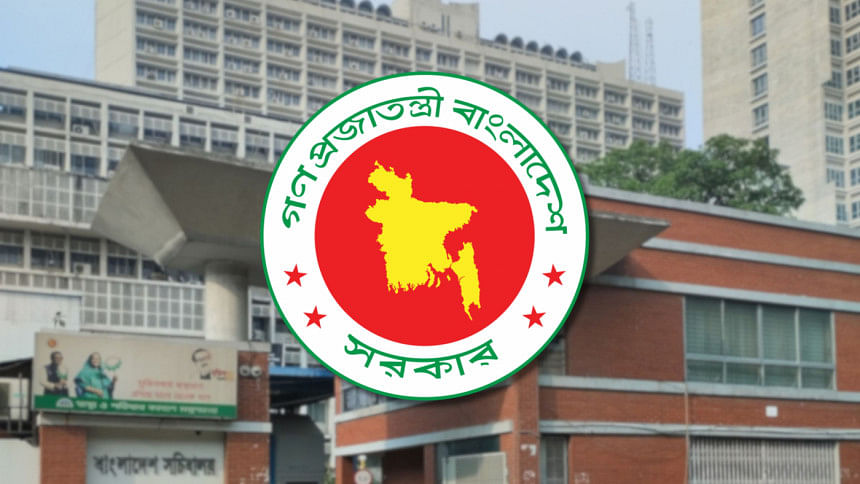Civil admin runs slow as top tier still jittery
The interim government is struggling to restore normalcy at the top and local administration despite being in power for more than seven weeks, leaving the implementation of government policies and service delivery in a wishy-washy state.
Secretary turnover accounts for the disorganised state of the civil administration, according to people informed with the discourse.
Of the 55 ministries and divisions, 34 have secretaries who were appointed during the Awami League’s tenure and 15 under the current administration. Six ministries and divisions have no secretary.
The secretaries who were promoted during the AL era are uncertain about their future, so they are not running their ministries and divisions effectively and with an iron hand, The Daily Star has learnt from people familiar with the matter.
“A decision is needed on the fate of these individuals without further delay — if they are staying on, the chief adviser must come out and tell these people that you are on my team, so do your jobs sincerely,” said a secretary who has recently been made officer on special duty.

“If the secretaries are not being told that they must work without fear, there will be no speed in the administration.”
On the other hand, the secretaries promoted by the interim government are not familiar with the key government processes yet, which is delaying them from getting a handle on their new roles, they said.
Negative information regarding the newly promoted and posted officials is being circulated by their batchmates, bringing down their morale.
Some retired officials are exerting pressure to be appointed as secretaries, creating fear among officials who are hoping to get promotion. The government has so far appointed six former officials as senior secretaries on contractual basis.
Many officials who felt they were deprived during the AL terms are also pushing for promotion and posting, adding to the chaos.
“It is right that the administration is experiencing a noticeable sluggishness,” said AKM Abdul Awal Majumder, a former secretary and public administration expert.
An official from the Cabinet Division shared an example of bureaucratic latency: 200 vehicles purchased by the ministry of public administration for deputy commissioners (DCs) and upazila nirbahi officers have been ready for delivery for more than a month now but have yet to be allocated.
The vehicles are parked out in open fields, leaving them exposed to damages.
As is practice, the secretary committee on administrative development makes important decisions on creating or dissolving government job posts, revising rules and approving new regulations.
The vital committee, headed by the cabinet secretary, typically convenes twice a month, but has not met even once after the interim government took charge.
As a result, proposals from several ministries are pending, according to officials familiar with the matter.
Cabinet Secretary Mahbub Hossain is refraining from convening a meeting to avoid an “awkward situation” as some of his senior officers have been appointed as secretaries on a contractual basis, the official said.
“In fact, he has been referring important decision-making to the secretaries who were his seniors — this has disrupted the hierarchy of the administration,” said one of the officials.
Mahbub could not be reached for comment.
“If the secretaries are not being told that they must work without fear, there will be no speed in the administration,” said Badiur Rahman, a former secretary and chairman of the National Board of Revenue.
Without the assurance and clear messaging from the top, a dynamic administration would not materialise, he added.
The changes of divisional and deputy commissioners has also exposed the lack of clarity in the interim government’s decision-making process.
While the divisional commissioners for two divisions were transferred, their replacements are yet to be announced. Another six divisional commissioners are expected to be transferred immediately, so they are unwilling to take any decisive actions.
On September 9, new DCs were appointed across 25 districts, with additional appointments made in 34 more districts on September 10.
However, a group of officials expressed dissatisfaction over the appointments and demanded the cancellation of the gazette notification announcing the new DCs.
On September 10, the protest escalated into a physical altercation in front of the ministry of public administration, which lasted for more than three hours.
In response to the incident, eight DC appointments were revoked and the joint secretary (field administration) of the public administration ministry was transferred.
A probe committee recommended disciplinary action against 17 deputy secretaries involved in the scuffle: severe punishment for eight, minor penalty for four and reprimand for five. The names of the offending deputy secretaries were not disclosed.
“Maybe the government is moving slowly regarding the matter as there is a huge criticism surrounding the promotion of officials to positions such as deputy secretary, joint secretary and additional secretary,” said retired secretary Awal Majumder.
Another secretary cautioned against making rapid changes in key positions, citing the challenges faced during the recent DC appointments.
While some partisan officials did take advantage in the case of appointment of secretary, DC or organ chief during party-led government, most positions are filled by professional officers.
The government will reap benefits if it runs the administration with honest and skilled officers deducting the partisan officials, the secretary said on the condition of anonymity.
LondonGBDESK//



Comments are closed.